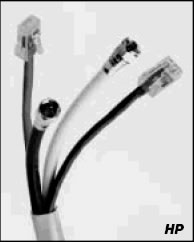May 2001
If you're looking for faster Internet access, better phone service or improved home entertainment options, you've probably come across some technical terms that you don't understand. Before you make your choices, it helps to know these terms, provided by the Copper Development Association.
 Bandwidth - The amount of data that can be transmitted in a fixed amount of time. For digital devices, bandwidth is usually expressed in bits per second (bps) or bytes per second (Bps); for analog devices, bandwidth is expressed in hertz (Hz), a unit of frequency equal to 1 cycle per second. Bandwidth sometimes refers to the amount of information, especially dissimilar types of information, which a system can handle.
Bandwidth - The amount of data that can be transmitted in a fixed amount of time. For digital devices, bandwidth is usually expressed in bits per second (bps) or bytes per second (Bps); for analog devices, bandwidth is expressed in hertz (Hz), a unit of frequency equal to 1 cycle per second. Bandwidth sometimes refers to the amount of information, especially dissimilar types of information, which a system can handle.
Bit - Short for binary digit, the smallest unit of information that can be processed or transmitted electronically. A single bit has one of two values: 0 or 1. Complex information is formed and transmitted by combining series of bits into larger units. Commonly used with the prefixes kilo (1,000), mega (1 million) and giga (1 billion) to express the speed of data transmission.
Byte - Usually equal to 8 bits, or equivalent to one typed character on a page. Large amounts of memory or storage are expressed in terms of kilobytes (nominally, 1,000 bytes), megabytes (nominally, 1 million bytes), and gigabytes (nominally, 1 billion bytes).
Coaxial Cable - A type of cable that consists of a center wire (solid copper is the best) surrounded by insulation and a grounded shield of foil, braided wire or both. The shield minimizes electrical and radio frequency interference.
Category 5 Cable - Along with Category 5e (enhanced), the most widely used type of telephone cable engineered to carry voice and data at higher speed with minimal interference and degradation. Category 5 cable consists of four twisted pairs of copper wire.
D S L - Abbreviation for digital subscriber line, a service based on technology that allows a single telephone line consisting of a pair of copper wires to receive and send different types of data transmissions simultaneously at high speed. With a DSL modem and service provider , users can download data from the Internet at speeds up to 8 Mbps.
Network - A group of two or more computer systems linked together for data sharing. There are many types of networks, including local-area networks (LANs), which link computers in close proximity to one another; and wide-area networks, which link computers that are far apart via telephone lines or radio waves.
Structured Wiring - An advanced telecommunications wiring system that includes high-capacity voice, data, audio and video wiring, installed in a "star" or "home-run" configuration with each outlet linked directly to a central hub.
